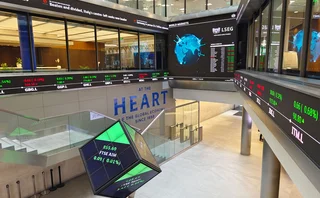
Asia house of the year: BNP Paribas
Bank reaps rewards of doubling down on Asia as rivals retrench

Structured Products Asia Awards 2016
The first six months of 2016 – bookended by the collapse in Asia-Pacific equities markets in early January and the UK's shock vote to leave the European Union in late June – represent the worst start to the year for equity-linked products since the financial crisis, issuers say. Volumes in key markets such as South Korea are below even 2008 levels, and showing little sign of recovering anytime soon.
Yet, in time, 2016 may come to be seen as a watershed: a few of those issuers that were already selectively retreating from the region's structured note markets look set to withdraw entirely; but others have stepped up to the plate, diversified their product offerings and their client base, and looked to ride out the storm. BNP Paribas has been in the vanguard of the latter camp.
"We're viewed as a stable institution with a strong commitment to Asia, in an environment where lots of our competitors are withdrawing. When large conservative asset managers here see what's going on at some of these institutions, they're asking questions. We've had a lot of pension funds and sovereign wealth funds (SWFs) proactively approaching us for more business, because they need a big European counterparty on their panels. We are now the only firm present across every market in scale who can fit the bill," says Yoram Layani, Hong Kong-based head of institutional sales for Asia ex-Japan at BNP Paribas.
Across the board, the bank has made gains both at the expense of retreating rivals and via strong organic growth in the region's few bright spots - principally mainland China. In foreign exchange products, where BNP also takes this year's award, it has learned the lessons of forex derivatives crises past and become a leader in the revamped target-redemption forwards (Tarf) market in Taiwan.
We put together a solution that allowed clients to switch from their A-shares ETF exposure to a certificate that offered the same exposure, plus a coupon we derive from the repo rate when we lend out their inventory
Krisztina Anspach, BNP Paribas
In China, the bank has moved swiftly to capitalise on the push by Chinese corporates to up their forex hedge ratios following the renminbi's sudden devaluation last August, when many got burned, doing a brisk trade in sizeable cross-currency swaps.
Though many banks – and the region as a whole – continue to feel the mammoth impact of the China equities crash of August 2015, BNP came up with a neat opportunity for private bank clients to play the whipsawing market.
As the China A-shares market began to look wobbly, short interest from hedge funds grew substantially. But with the strict regulatory quota system making it difficult to access the equity market, funds were limited in their capacity to short the shares. Many investors use the exchange-traded fund (ETF) markets to express long or short interest in the underlying stocks.
With short interest so high but stock levels so scarce, equity repo rates – the fee a firm wishing to short-sell a stock must pay the owner in order to borrow it – jumped to crazy highs. At one stage, the repo rate on one of the most popular ETFs, the CSOP FTSE China A50 ETF, shot above 25%.
Here, BNP spotted an opportunity to allow its private bank clients – big holders of the ETF – to benefit from the dislocation, says Krisztina Anspach, the bank's Hong Kong-based head of cross-asset solutions for wealth management and family offices for Asia-Pacific.
"With a few exceptions, private banks are not set up to allow their clients do stock lending. So even though many have large equity holdings, a lot of that inventory doesn't get lent out. We put together a solution that allowed clients to switch from their A-shares ETF exposure to a certificate that offered the same exposure, plus a coupon we derive from the repo rate when we lend out their inventory," says Anspach.
The trade proved extremely successful, and helped clients who maintained their long exposure to China A-shares weather some of the losses that followed when the A-shares market sank.
Replacing rivals
One of the most obvious signs of BNP's commitment to the structured notes business over withdrawing rivals is the continuing trade it does in buying up their books and market-making activities when they do so – a move underscored by its purchase of RBS's £175 billion ($232 billion) global structured products book when it exited the business a couple of years ago. Moves to acquire the market-making seats of regional rivals – including Standard Chartered most recently in the first quarter of this year – have followed.
"We're building a very healthy business in buying up other people's books as they get out of the business. In the present climate, it's likely there will be another one along soon," says Layani bluntly. "We've done it in with Credit Agricole and RBS. We also took over Standard Chartered and Citibank's market-making activities. That speaks to the confidence we have in our risk management capabilities. But we also have a different view to other houses on what the fair value of book might be in a particular market, and a better understanding of what the price should be. We buy them at a price that is hedgeable, not at headline book value."
The bank is also committed to organic growth. It has identified Hong Kong as a key region where multi-asset products are currently undersold to the region's army of high-net-worth (HNW) and retail investors – moves that powered it to the Hong Kong house of the year award as well.
"Post the creation of our global markets business, we've launched a major strategic initiative around the coverage of our strategic private wealth clients. We now cover them in truly cross-asset mode. The team now covers everything from cash through cross-asset derivatives. We take the view that wealth management still has room for rapid growth across the region. Beyond Hong Kong and Singapore, we've started seeing the emergence of a fully fledged private banking business in mainland China," says Anspach.
The results of the push are evident: "For basket trades on Hong Kong underlyings, BNP are now consistently the best. Other players who were more aggressive last year have dropped off, while BNP have really upped their game," says a senior executive at one large private bank in Singapore.
"Their pricing is fine, but it's more the quality of their trade ideas and their research that really differentiates them," says another senior Singapore-based private banker. "To be honest, pricing fluctuates between houses. One week someone is the most aggressive; the next it's someone else. We value consistency and quality of service far more."
Risk recycling
Another key underpinning behind the bank's growing market share in flow products has been the expansion of its network of funds and other specialist buyers of exotic equity swaps it can turn to for risk recycling. Regional hedge fund clients say the firm has been the most proactive issuer when it came to presenting opportunities around the equity market dislocations that occurred during the first quarter of this year. Another large fund manager based in Europe says it plans to start trading variance swaps with the bank in the near future, after it presented it with attractive trade ideas other houses hadn't pitched.
"They've been doing very good work around the market dislocations on the HSCEI and the Nikkei this year. We've done some corridor variance trades with them. They've been very proactive in putting trade ideas in front of us, particularly around dual index plays," says a senior Hong Kong-based trader at one hedge fund.
"When there's a spike in volatility, we activate the recycling machine. Every time there is a market correction, it creates opportunities for relative value trades. We've structured quite a lot of products to institutional clients in that space, especially corridor variance swaps on the Nikkei given that it's been so choppy this year. We have recycled a good chunk of our vega using them. This has been a great trade for investors: the spread between Nikkei and S&P has been realising very well. Typically, a fund could expect to see a return of five volatility points, which is very good for a relative value trade," says Etienne Grisey, head of equity derivatives structuring for Asia-Pacific at BNP Paribas in Hong Kong.
The bank's alternative risk transformation team (ART) has also been expanding its client roster in the region. The bank has previously described the ART team's purpose as being geared towards reducing the constraints it faces in terms of capital, risk-weighted assets and the liquidity ratio, while also generating trade opportunities for clients that are happy to sit on sometimes sticky, long-dated risks.
"Last year, ART was a new concept applied mostly to recycling pure trading risks that are otherwise hard to hedge. Now it's becoming a fully bedded in and profitable business with a much wider range of topics addressed. I'd say the amount of such trades we've done with asset owners in the region has grown by about half in the past 12 months," says Layani. "This focus has helped generate new business opportunities, addressing a precise client need – the hunt for yield – while reducing the cost of business for BNP Paribas. In turn, it allows us to be more flexible and agile, and to commit capital to do more business."
Only users who have a paid subscription or are part of a corporate subscription are able to print or copy content.
To access these options, along with all other subscription benefits, please contact info@risk.net or view our subscription options here: http://subscriptions.risk.net/subscribe
You are currently unable to print this content. Please contact info@risk.net to find out more.
You are currently unable to copy this content. Please contact info@risk.net to find out more.
Copyright Infopro Digital Limited. All rights reserved.
As outlined in our terms and conditions, https://www.infopro-digital.com/terms-and-conditions/subscriptions/ (point 2.4), printing is limited to a single copy.
If you would like to purchase additional rights please email info@risk.net
Copyright Infopro Digital Limited. All rights reserved.
You may share this content using our article tools. As outlined in our terms and conditions, https://www.infopro-digital.com/terms-and-conditions/subscriptions/ (clause 2.4), an Authorised User may only make one copy of the materials for their own personal use. You must also comply with the restrictions in clause 2.5.
If you would like to purchase additional rights please email info@risk.net
More on Awards
Trading systems: structured products/cross-asset – Murex
Murex won the Trading systems: structured products/cross-asset award at the 2025 Risk Markets Technology Awards for its MX.3 platform, praised for its flexibility and advanced analytics
Best vendor for system support and implementation: Murex
Murex has won the Best vendor for system support and implementation at the Risk Markets Technology Awards, recognised for its innovative MX.3 platform, exceptional client support and seamless implementation services
FRTB-IMA product of the year: Murex
Murex wins FRTB-IMA product of the year for its advanced, scalable MX.3 platform enabling seamless regulatory compliance
Pricing and analytics: equities – Finastra
Finastra’s Sophis platform wins the Risk Markets Technology Award for Pricing and analytics in equities, recognised for its robust capabilities in equities and derivatives trading
Best execution product of the year: Tradefeedr
Tradefeedr won Best execution product of the year for its API platform, which standardises and streamlines FX trading data, enabling better performance analysis and collaboration across financial institutions
Collateral management and optimisation product of the year: LSEG Post Trade
LSEG Post Trade wins Collateral management and optimisation product of the year for interconnected services that help mitigate counterparty risk and optimise capital usage
Clearing house of the year: LCH
Risk Awards 2025: LCH outshines rivals in its commitment to innovation and co-operation with clearing members
Driving innovation in risk management and technology
ActiveViam secured three major wins at the Risk Markets Technology Awards 2025 through its commitment to innovation in risk management and technology








